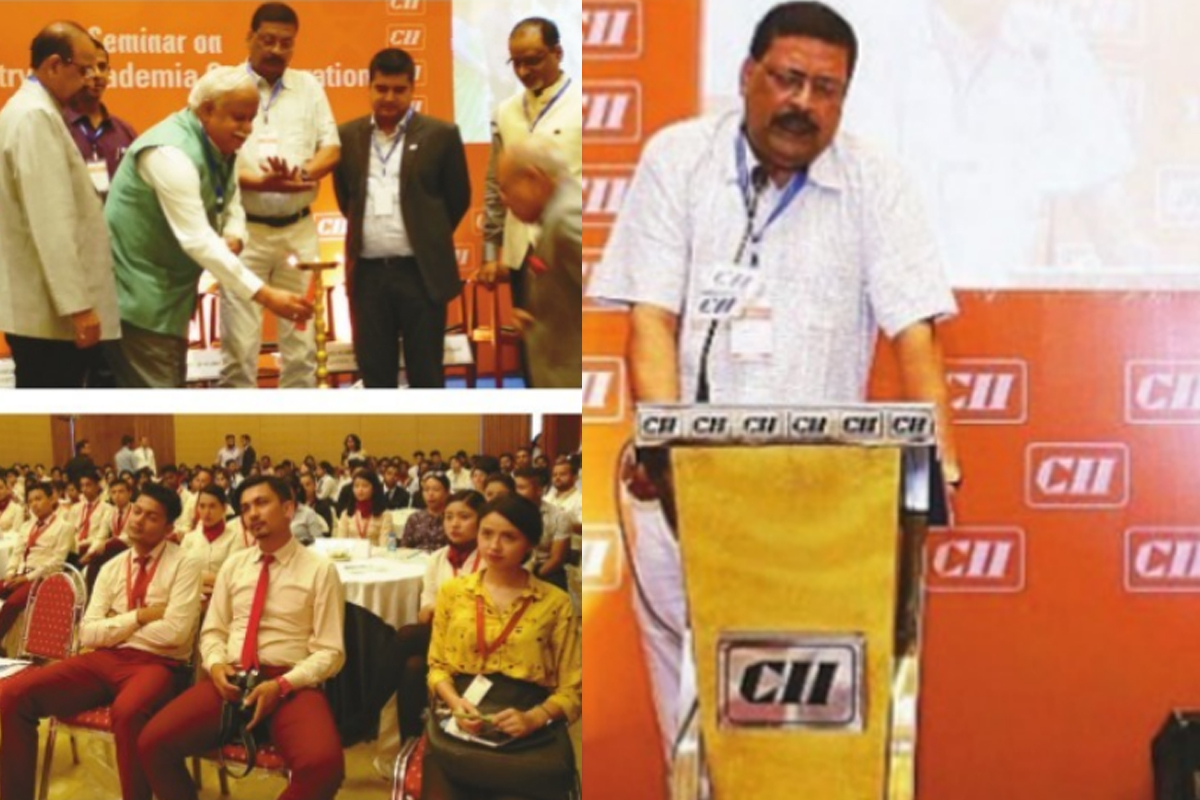Private capital expenditure expected to spike amid rising external challenges: CII
The survey revealed that 59% of respondents anticipate an increase in private capital expenditure during April-September compared to the previous six months.
The Confederation of Indian Industry (CII), North Bengal Zone, in association some other organizations, made arrangements for students to interact with industry stakeholders on ‘Employability Skill’ in Siliguri recently.

PHOTO: STATESMAN NEWS SERVICE
How can a 13-year-old student in the USA shine and be successful, and we cannot do that in our country, a student asked during a session for students on ‘Employability Skill.’ The Confederation of Indian Industry (CII), North Bengal Zone, in association some other organizations, made arrangements for students to interact with industry stakeholders on ‘Employability Skill’ in Siliguri recently
Vice-Chancellor, ICFAI University in Sikkim, Dr Jagannath Patnaik, was one of the speakers on the subject, while he faced a myriad of questions from students on the difference between the education system in the two countries. The arrangements for the students was made during a seminar on Industry-Academia Collaboration organized by the CII by keeping in mind education, skill and entrepreneurship development. The students and the speakers interacted during panel discussions on ‘Innovation, Creativity and Employability as per the Industry in Educational Ecosystem’ and the role of government machinery
Advertisement
Addressing the inaugural session of the seminar with the theme ‘Making Future Ready’, Registrar of the University of North Bengal, Dr Dilip Kumar Sarkar, appreciated the CII’s role in formulating a series of sensitizing programmes collaboratively with the University of North Bengal for aspiring youths and make them industry-ready. “Industry and academia are the two pillars of economy,” he said
Advertisement
Dr Sarkar also pointed out that the Centre of Innovative Studies (CIS) has been introduced by the University of North Bengal to provide technical knowledge for students were Industry demands can be fulfilled. The chairman of CII, North Bengal Zone, Anand Kumar Agarwala, told the session: “Academia and industry have different purposes and different ideologies. However, the rapid pace of change in the competitive world is compelling these two to come together to address and solve some of the real world challenges.”
Quoting the National Employability Report 2016, Mr Agarwala pointed out: “Our graduate engineers remain unemployable. A study report shows more than 1,50,000 engineering students, who graduated in 2015 from over 650 colleges, 80 percent of them were unemployable and only 3 per cent had suitable skills and were employable in software or product market. Though educational institutions are training millions or youngsters, corporate are often complaining that they are not getting the necessary skills and talent required for a job.” The CII chairman urged the house to start discussions on the issue to resolve the existing problems and find solutions
The CII had invited Joint Director of Micro, Small, Medium Enterprise and Textile, government of West Bengal, Dipankar Chakraborty, to speak on the role of government machineries for entrepreneurship development in different sectors and skill development.
Mr Chakraborty took part in each session to showcase his department’s role and stressed on the need to develop skills as required by the employer. He also pointed out to how lost cost 3D printing had started controlling the present market and described opportunities, challenges and future in India.
Notably, some recommendations were also made during the sessions, like for the CII to bring in all educational institutes and industry to one platform regularly by organizing meetings and bridging the gap and meeting the criteria required between the industry and the institute.
Principal of the state-run Jalpaiguri Polytechnic, Dr Pujan Sarkar, spoke for and against the present system and the government’s education policies during panel discussions on ‘Innovation, Creativity and Employability as per the Industry in Education Ecosystem,’ and he proposed that the CII come forward to bridge the gap. The discussions were unique as two groups took part and interacted there. There were four persons in each group. Ahmed Raza, Dr Pradosh Adhvaryyu, Sarabjit Singh Hora and Dr Pujan Sarkar represented educational institutions. On the other hand, Pradeep Purohit, Amit Ranjan Mahato, Abhinanda De and Bhaskar Roy represented the industry. The session moderator was Mohan Debnath, chair CIINB MSME Panel and Director.
Dr Adhvaryyu, the Dean of Engineering and Technology, Siliguri Institute of Technology, proposed the Joint Director MSME to organise a programme jointly for developing sustainable partnership between industry and academia.
More than 200 participants from different educational institutes, including those from Sikkim, took part in theprogramme to interact with industry stakeholders like Arun Agarwal, Dr Jagannath Patnaik, Anand Agarwala, Mohan Debnath and others. Arun Agarwal, an education counselor from Global Reach, argued in favour of internship for skill development to overcome the present crisis.
Advertisement